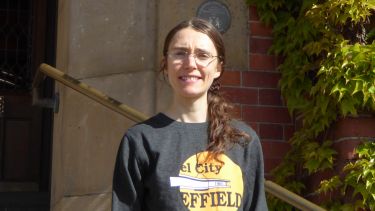Excellent support for PhD students
What are you studying?
I am studying a postgraduate research programme in the Animal and Plant Sciences Department. My project focuses on parasitic weeds of the Striga genus that infect staple crops, particularly in sub-Saharan Africa.
Why did you choose a research programme?
During my undergraduate degree, I completed several summer vacation research placements. These gave me a taste of managing my own research project and designing experiments to address a specific question that interested me.
I really enjoyed the constant stimulation and challenges. This increased my confidence and made me realise that it wasn’t completely outrageous for me to apply to do a PhD.
Even though I wasn’t sure whether I wanted to stay in academia long-term (and I'm still not), a PhD was the natural next step as it was a gateway to so many scientific careers that I am interested in – including science communication and science policy roles.
What led you to choose Sheffield for your PhD?
Sheffield was a very close second choice for my undergraduate degree, so I was already aware of the high standard of the University departments, and the good quality of life in Sheffield.
Just when I started my search for available PhD positions, my (now) supervisor came to our department as an invited speaker to give a seminar. I was really struck by how her work was making a difference by directly benefiting subsistence farmers in Africa and at the end she announced that she had a PhD available to start in the following academic year.
I had found the talk so inspiring that I knew the topic would motivate me throughout the length of a PhD.
I applied and was invited for an interview. Compared with some of the other interviews I had, the University of Sheffield gave me the impression that I would be treated as an individual, rather than just another PhD student in the crowd.
This convinced me that Sheffield would be a great place to live and work for the next three years.
Is there anything you particularly enjoy about postgraduate study in the Animal and Plant Sciences Department?
Our department is very international – in my lab alone, we have students from Germany, France, Iran, Tiawan and Africa. It is a really good crowd, and everyone is always willing to share ideas and help one another.
There’s always so much going on, including regular seminars and the daily coffee break, when all the postgraduate research students and staff come together. We even have a departmental ‘bake-off’ for charity every Monday!
Our department is also very active in public engagement, including the annual ‘Discovery Night’ open evening; the Christmas Lecture for primary schools; the Alfred Denny Museum and the Festival of Science and Engineering. Sometimes, there is almost too much going on!
The University of Sheffield gave me the impression that I would be treated as an individual, rather than just another PhD student in the crowd.
Caroline Wood
PhD student
Have you had opportunities to develop professionally over and above your research?
I have done numerous career development courses, including the Sheffield Graduate School and the Springboard Development Programme for Women.
The Sheffield University Graduate School was a three-day, semi-residential event that brought together graduate researchers from all over the university to participate in challenges, including a way to re-brand Span, to build skills such as entrepreneurship.
These programmes helped enormously in giving me some perspective on my life progress so far, and developed my skills in interviews, teamwork and assertiveness.
I was also able to take part in the Biotechnology YES entrepreneurship competition. As part of a team from the University of Sheffield, I helped to design a business model for a plausible biotechnology-related product which we then pitched to business experts.
It was a brilliant experience, and taught me a lot about business planning, finance and intellectual property.
What has been your biggest achievement or given you the greatest sense of satisfaction during your studies so far?
The way in which my science-communication skills have developed during my time at Sheffield is a source of great personal satisfaction to me.
Before I came here, I had only managed to publish a few articles aimed at secondary school children. By taking advantage of communication workshops and any opportunities to write, I have since improved my technique enormously.
I now have a much more varied portfolio and also have gained experience in writing press releases – some of which were picked up by mainstream media including The Daily Telegraph, The Metro and The Today Programme. This will be invaluable for the science-communication careers that I am considering for when I finish my PhD.
On a more personal level, perhaps my greatest achievement is to simply still be here and making progress with my PhD. When I first came to Sheffield, I was in a critical condition physically due to a long-term battle with anorexia. This ultimately put me in hospital, but with support from the university, I was able to recover and restart my studies.
Even now, I struggle with depression and with managing my weight, but the continued help I receive from the University medical services, my department and my supervisor has allowed me to get this far without ‘Anna’ from beating me. Hopefully, I can keep going now until the end.
What one piece of advice would you give to someone thinking of studying postgraduate at Sheffield?
When considering where to do your PhD, don’t just consider the rankings in the official guides – think about where you will actually be happiest.
Doing a PhD is very tough at times, and you will need enough motivation and support to last the course. Sheffield offers a lot of support in all areas – department support, career development, health and wellbeing, etc. – and this can make all the difference when you are struggling.

